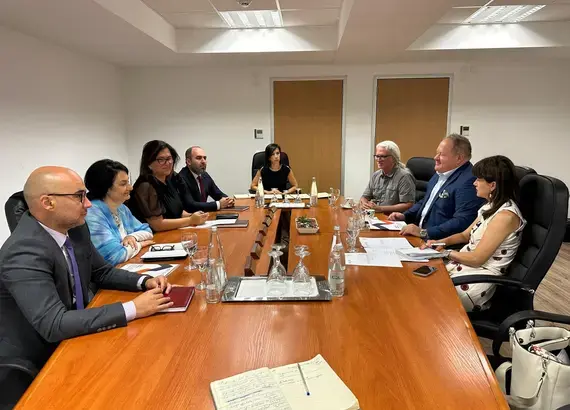
Success Story
Monitoring the Alleged Abuse of State Resources in North Macedonia
In North Macedonia, alleged abuses of state resources increase during election cycles. These abuses of state resources undermine Macedonian citizens' faith in the electoral process, and their trust in public institutions. The perpetrators of the alleged abuse tend to be politically-appointed senior civil servants in state institutions, who also occupy key positions within political parties. The perpetrators take advantage of insufficient government spending oversight and the lack of consequences for abusing state resources. Several institutions in North Macedonia, such as the State Commission for Prevention of Corruption (SCPC), the State Audit Office (SAO), and the State Election Commission (SEC), are responsible for preventing the abuse of state resources in elections. Unfortunately, they lack the human resources needed to effectively monitor election campaigns, and, therefore, they largely rely on reports from civil society. Under the National Endowment for Democracy, the National Democratic Institute (NDI) is working to help independent regulatory bodies close the gap in the systematic monitoring and reporting of the alleged abuse of state resources during elections.
To understand how state institutions and political parties behave during election cycles, a local civil society organization (CSO), the Association for Research and Analysis (ZMAI), partnered with NDI. They used data from the 2024 parliamentary and presidential elections in North Macedonia, as well as publicly available data from the previous 12 years, to shed light on these activities. Following an initial capacity-building training led by NDI and focused on NDI’s guidance document, How Citizen Organizations Can Monitor Abuse of State Resources, participants from ZMAI immersed themselves in the challenge of data acquisition and analysis.
To address gaps in the systematic monitoring and reporting of state resources conducted by the independent regulatory bodies that observe electoral campaigns, NDI and ZMAI partnered with the SCPC, the main parliamentary body responsible for developing anti-corruption policy and countering the abuse of state resources. Although the SCPC has full access to election campaign bank accounts to verify campaign finance reports, the institution lacks the human resources to produce the special reports and fulfill its legal obligation. To assist the SCPC, ZMAI agreed to conduct an analysis of the financial data from the 2024 elections to create two special reports on the state of campaign finance: one on the presidential elections and the other on the parliamentary elections. In August 2024, the SCPC published the two special reports, (The Special Report on the State of Electoral Campaign Finance for the 2024 Presidential Elections in the Republic of North Macedonia and The Special Report on the State of Electoral Campaign Finance for the 2024 Parliamentary Elections in the Republic of North Macedonia).
ZMAI, with financial and technical support from NDI, assisted the SCPC in the preparation of the two special reports, both of which were presented to the Assembly. This support was crucial for the state institution to fulfill its legal obligation. Importantly, SCPC staff worked alongside ZMAI staff as they prepared the special report on campaign finance in the presidential election, learning how to convert their files to the open data format from their ZMAI colleagues. SCPC staff also aided in the preparation of the special report on campaign finance in the parliamentary elections, gaining the experience and knowledge to compile and analyze the data independently.
Through NDI and ZMAI’s engagement with the SCPC, ZMAI also overcame a longstanding data collection challenge. As part of its efforts to analyze public sector hiring for the past 12 years, ZMAI requested data from the North Macedonia Ministry of Information Society and Administration (MISA). The requested information should have arrived in an open data format, but it was received on paper and significantly past the legally required timeframe. These challenges prompted conversations with the SCPC, along with stakeholders from state institutions on the need to meet legal deadlines for data requests and amend legislation to ensure data is stored and shared in the correct electronic format. In the current parliamentary session they're changing the procedure for these requests based on this report. Despite the challenges in data collection, ZMAI’s preliminary analysis of hiring in the public sector reveals that there is often an increase in temporary hires and consulting contracts prior to and after elections. The uptick in these temporary and consultant contracts during electoral processes may be being used for political purposes and would constitute an abuse of state resources.
In October 2024, the SCPC held a presentation on the two special reports, during which ZMAI and other CSO representatives stressed the importance of using the open data format to ensure comprehensive monitoring of state resources during elections. Through their partnership with ZMAI, NDI helped increase the transparency of campaign finance and public sector employment data in North Macedonia. In February 2025, ZMAI will launch a dynamic dashboard that will cross-reference data on public tenders and payments in the public sector. Under their partnership with NDI, ZMAI will also publish a final report in January 2025 which will include analysis from the 2024 campaigns and procurements in the public sector. Through NDI’s partnership with a local CSO, state institutions in North Macedonia have made significant progress in monitoring and reporting the alleged abuse of state resources in elections.
NDI’s engagement with this program is implemented with the support from the National Endowment for Democracy (NED) program.

